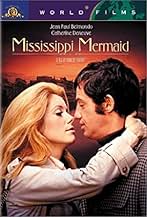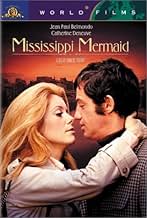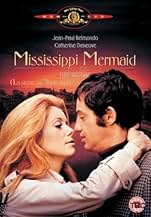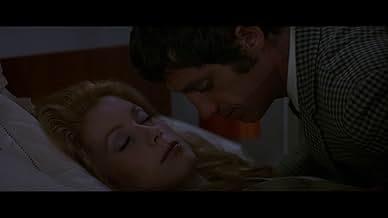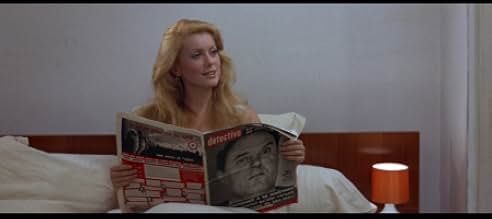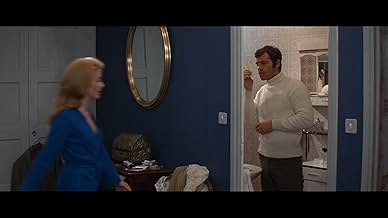Il ricco proprietario di una piantagione è ammaliato da una donna misteriosa con un oscuro passato.Il ricco proprietario di una piantagione è ammaliato da una donna misteriosa con un oscuro passato.Il ricco proprietario di una piantagione è ammaliato da una donna misteriosa con un oscuro passato.
- Regia
- Sceneggiatura
- Star
Recensioni in evidenza
Jean Renoir was the great humanist director. For him, all that matters is how we treat human beings. The same here for Truffaut. The film tells us that it does not matter if you're rich or poor, male or female, upholding the law or fighting it, the only thing that matters is love. This is a romantic film that has occasional touches of a good mystery/detective/noir film. The Hitchcock film that it most reminded me of was "Marnie". There, like here, it is hard to know if crime or patient love will win out in the end.
I did not care much for the New Wave style editing, which seemed out of sync with the dramatic story at times. The many shots of Belmondo driving kept reminding me of the beginning of "Breathless." The color seemed a bit dull and washed out.
The locations are lovely, but Truffaut seems to have only one thing on his mind, the relationship between the lead characters, Louis and Juli/Marion. The characters and the audience think they know each other, but the film keeps fooling them and us. We are constantly getting new information that makes us re-evaluate who they are and they are constantly surprising each other. For example, Louis has been telling Juli/Marion how much he loves her and how beautiful she is and then suddenly he gets upset and tells her how there are many of her kind - she is not really a woman or a girl, but a "chick". The term "chick" is far more demeaning here then the term "bitch" or "slut" could ever have been. He tells her that her cold attitude actually makes her ugly. Watching the scene, one thinks about how easily and naturally men can degrade women, even women they love.
The film is a bit long and occasionally meanders, but it is emotionally intense at many points along the way. It seems that nothing is happening and then suddenly there's a surprise that makes you think, "Oh my goodness, I didn't expect that." It may not be one of Truffaut's best films, but second-rate Truffaut is still better than 90% of other directors' best stuff.
Next to "The Soft Skin", coincidentally staring Deneuve's sister (the late Francoise Dorleac), this would have to be my favourite Truffaut film.
As well as directing, Truffaut also wrote the screenplay. Something that always strikes me about Truffaut is his almost childlike innocence when presenting a story -- one could almost call it naivety.
There's a scene towards the end of the film where Belmondo returns to the apartment in Lyon with the remains of the loot. He rings the doorbell and Deneuve answers wearing a negligee. In the time it takes Belmondo to reach their room from the street, Deneuve changes into her dress, puts on her best pair of stockings and shoes, then lies on the bed and pretends she is asleep. It's a scene that could almost come from the mind of a child - but that's Truffaut for you.
Watching Catherine Deneuve in her films of the late 60's is indeed a sensory pleasure. She is so extraordinarily beautiful it is almost painful for us to watch. Incidentally, for those fans, there are a couple of topless scenes of her in this film - indeed a sinful pleasure.
I disagree with previous posters. I see nothing 'Hitchcockian' about the film at all. As for the 'look' of it - i love the look of the older film stock used in the 60's. It certainly gives films of this period a unique look.
Highly recommended for both Deneuve and Truffaut fans......
We are gifted some telling footage of the tropical island, a potted colonial history of its relationship with France and an extended amplified soundtrack consisting of a mixture of bird and animal exotic sounds. Unfortunately as we descend deeper into the story Truffaut soon relies on colossal contrivances to propel things along.
Belmondo's character Louis, says early on that he didn't fully reveal facets of himself in early correspondence, so as to sensibly establish some secure boundaries. Yet, it would appear in the film that barely a day or two after getting married, he gives his new wife, (Deneuve playing) Julie, open slather on his personal banking and business accounts. Then after Julie subsequently cleans him out (with no-one in the bank obviously batting an eye - lid) and disappears into the ether, of all the women in the world, he just happens to see her on TV and tracks her down quicker than you can say bloodhound. And narrative wise things don't get any better after both individuals reunite.
Twists occur, but again, they appear out of character and forced. Deneuve, at the height of her beauty, is too chic, cultured and well - spoken to play a supposedly poorly educated and raised grifter. Belmondo, never strikes one as a vengeful suitor, capable of murder. However this is the sort of unbelievable stuff Truffaut expects us to swallow.
Miscast as they are, I can't say I didn't appreciate seeing the 2 charismatic French stars, but I have to sadly reiterate, that in my opinion, things fall rather flat, after the lead characters leave their initial tropical locales. However might I suggest that watching Mississipi Mermaid is a much better venture, than chasing up its far inferior 2001 remake Original Sin, with Angelina Jolie and Antonio Banderas.
Jean-Paul Belmondo puts aside his typical suave and cool demeanor to play a wealthy but lonely and somewhat naive tobacco plantation owner who puts in a request for a mail-order bride, only to discover that she looks like Catherine Deneuve. Naturally, he is taken under her spell and soon discovers she is much more duplicitous than he expected. Many film lovers may know this story better as it was remade in 2001 with Antonio Banderas and Angelina Jolie as Original Sin. Despite having not seen that film, I am confident it cannot be better than this version for two reasons. First of all, Truffaut is a much better director, able to seemingly tie all these various strings together into a coherent and plausible story. Second, there is no way Banderas and Jolie could match the sizzling chemistry between Belmondo and Deneuve. They are capable of being remarkably sexy and sultry without resorting to complete nakedness. This is a sign of true thespian abilities.
While not one of Truffaut's stronger works such as his Antoine Doinel series or Jules and Jim, it is still an entertaining romantic thriller that manages to be both romantic and thrilling. Given the status of many of these types of films recently, there is plenty of reason to revisit this New Wave example.
There are a few clichés which come to mind, but "Love is Blind" is ironically the most apt, for it is the irresistible beauty of Deneuve that prevents her mail-order husband from accepting the truth. She lied before, so why not again, and again, and again? Clearly the relationship is doomed, but the illusion continues on for now, strengthened by the sacrifice already made on her behalf...
Lo sapevi?
- QuizQuite uniquely, director François Truffaut chose to shoot the film almost completely in chronological order. The reasoning for this was that he found the relationship between the two main characters so important, he wanted it to develop in a natural way. Truffaut actually spent the nights re-writing the scenes he would film the next day, to follow the dynamics between the leading couple.
- BlooperWhen the disc Marion has recorded is run over in the street and shattered, she kneels to retrieve the pieces; at first her right knee is uppermost, but then suddenly her left knee is higher, as she stands.
- Citazioni
Louis Mahé: Here we go. You're sulking. I knew it. Now you're just pretending to be mad because inside you're not really mad. You put on that cold look... but inside you're smiling. Come on. Show me your smile.
Julie Roussel: I'm fed up with all that smile crap! It doesn't work anymore! Don't speak to me. For Christ's sake, leave me alone!
Louis Mahé: All right. Okay. That's fine with me. It's not difficult to know what you're thinking of me. And you're asking yourself... "Why the hell am I with this guy who's broke... and can't even knock over an old lady in the street to steal her purse?"
Louis Mahé: [Continues, as Julie maintains an air of indifference] You only think of yourself. You're not a selfish girl. You're selfishness personified. You think that you're a real person, that you're unique. But you're not. You're just one in a growing multitude of girls now... not really bitches, not really adventuresses or whores, no... But some kind of parasite... who live outside normal society. You're not women or girls. You're "chicks". What else you are doesn't have an exact name. Mindless, with your heads full of garbage or air. You're in love with your own bodies. You're always going out in the sun, always tanning. You spend hours fixing your face. You can't pass by a car without looking at your reflection in the windshield. But you know where to find most of these girls? In airports. Yes! Everywhere planes are taking off for faraway spots. Because you are beautiful girls, and beautiful girls get fought over. They're invited from one big city to another. And they go there. They stroll around everywhere... with their little purses in hand, all made up.
Louis Mahé: [as Julie slightly glares at him] Now you're really mad. That makes me happy. Because when you're mad, your mouth gets twisted... it gets crooked. And you turn ugly. Really ugly. So dreadfully ugly.
- Versioni alternativeSPOILERS: In some versions of this film, the image of the comic strip in the newspaper that makes Belmondo's character realize his wife has been poisoning him has been removed. The probable reason is that the whole idea is a bit naive and absurd, although without this image it is impossible to explain how the man finds out that he has been poisoned. (As the comic strip in question involves Disney-related art of Snow White being offered the poisoned apple by the Witch, the removal of the cartoon in some versions is more likely due to issues involving Disney's copyright.)
I più visti
Dettagli
- Data di uscita
- Paesi di origine
- Lingua
- Celebre anche come
- Mississippi Mermaid
- Luoghi delle riprese
- Aziende produttrici
- Vedi altri crediti dell’azienda su IMDbPro
Botteghino
- Budget
- 8.000.000 FRF (previsto)
- Lordo Stati Uniti e Canada
- 33.725 USD
- Fine settimana di apertura Stati Uniti e Canada
- 11.206 USD
- 25 apr 1999
- Lordo in tutto il mondo
- 33.725 USD


